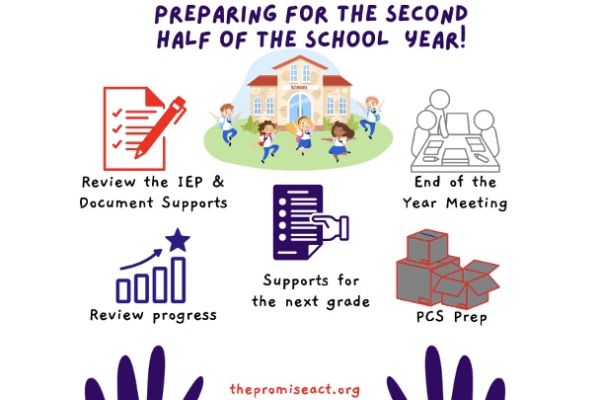
Preparing for the Second Half of the School Year
| Featured Article
Winter break is over, and the kids are headed back to school. While this can be a sigh of relief, if your kids eat twice what they eat in a school day when they’re on break like my children do, it can also be stressful if your child is in Special Education. Four to five months of school left and it’s time to get back on top of their education. Here are some recommendations for preparing for the second half of the school year!
Tips for the Second Half of the School Year
1. Review the most recent Individualized Educational Plan (IEP)
Review your child’s IEP to ensure it reflects their current needs. Instead of waiting for IEP meetings, consider quarterly reviews. Check if goals, services, and accommodations are up-to-date. Evaluate the necessity of existing goals and services and consider if new goals are needed. If an annual goal was mastered, aim to replace that goal with a new ambitious an challenging goal to ensure that your child is making educational progress. Additionally, document any unofficial support provided by teachers or service providers. This ensures a comprehensive and effective plan for your child’s education.
2. Document your child’s educational progress and behaviors after the winter break
This is very important when the IEP Team discusses Extended School Year (ESY) services before the end of the academic year. Take notes and data now on your child’s work after the holidays. Did your child regress in any of their behaviors at school? Did your child lose any skills previously learned and how long is it taking them to recoup those skills? Collect the data now so that you will be prepared at the next IEP meeting to discuss ESY eligibility.
3. Inquire about a date for the end-of-year IEP meeting
Plan an IEP meeting before the school year ends, even if you’ve already had your annual meeting. Remember, the annual meeting coincides with the date the IEP was initiated. Transitioning to a new grade may necessitate adjustments in support. Consider new needs like state testing in higher grades and discuss required accommodations. Ensure your child’s IEP is prepared for the upcoming school year.
Review progress reports, report cards, and goal progress
Review your child’s progress reports, report cards, and IEP Goal Progress Reports. Look beyond letter grades to assess improvement with support. Examine challenges in learning material and evaluate both academic and behavioral progress. The IEP can be adjusted to address any concerns that arise.
4. Request accommodations, services, and support for the next grade
Prepare for new grade challenges by assessing necessary supports and accommodations. Consider state testing accommodations for grades like 3rd, 5th, and 8th. Address specific needs, such as notetaking in 6th grade or extended transition time between classes. This is crucial for all grades, especially during transitions like elementary to middle school or middle school to high school.
5. Permanent Change of Station (PCS)
PCSing? Check the earliest accelerated withdrawal date and unenrollment period in your current state and the new one. Obtain physical copies of your child’s updated IEP. Reach out to the School Liaison in both states for support and guidance, making the transition smoother.
Conclusion
The second half of the school year can be stressful, but hopefully this article helps ease some of that stress. Comment below and let us know how you prepare for the second half of the school year.
About the Author
Destiny Huff is the Social Media Manager for Partners in PROMISE. She is a proud Army spouse, former military brat of a Retired CS, and mother of two amazing neurodivergent boys. As a Licensed Professional Counselor, Special Education Advocate, and IEP Coach, Destiny works with military service members and their families in mental health and special education. Destiny holds a Bachelor’s Degree and Master’s Degree in Psychology and is currently a Doctoral Candidate in a General Psychology Program. Her research focuses on the use of bibliotherapy as a clinical strategy to address the unique challenges that military children face. Destiny currently runs both her Private Practice and Advocacy business, while continuing to advocate for her children’s needs and educating others on Neurodivergence.






Leave a Reply